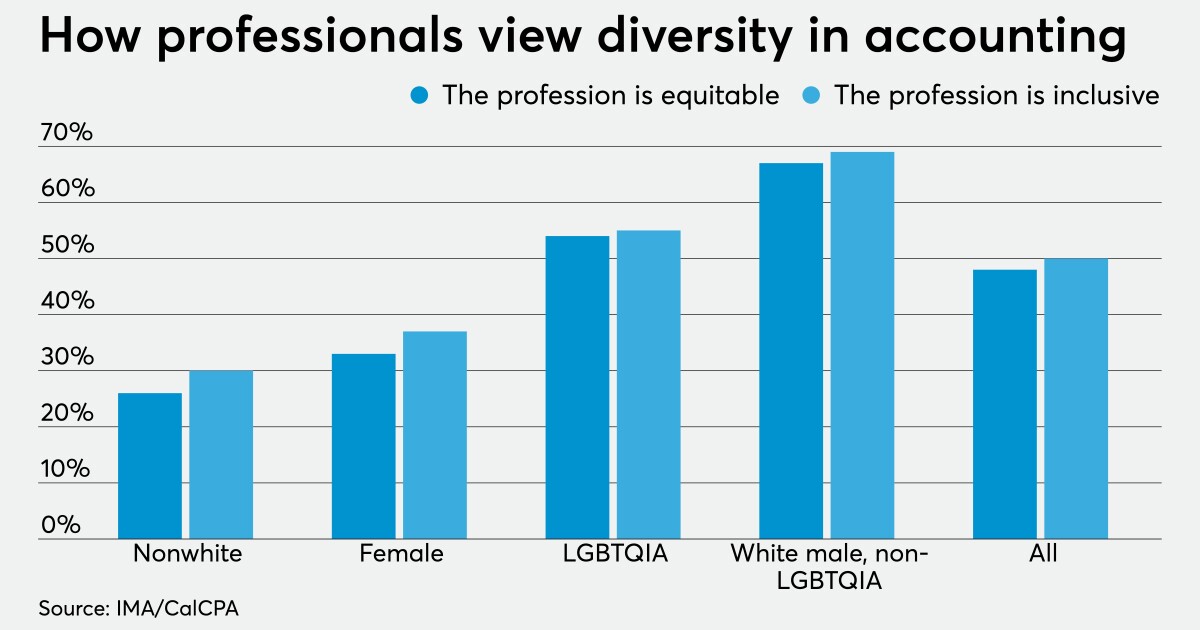
The accounting profession is struggling to build a fully equal and inclusive workplace — and that is causing diverse professionals to leave firms altogether, according to a new report.
Co-authored by the Institute of Management Accountants and the California Society of CPAs, the report, “Diversifying U.S. Accounting Talent: A Critical Imperative to Achieve Transformational Outcomes,” found that efforts at retaining, promoting and including diverse talent — especially at the senior and managerial levels — are struggling, despite strides made in recent years on the recruiting and talent pipeline fronts. The report cited AICPA data that found for every 10 of the profession’s most senior leaders, nine are white, eight are male, and few openly identify as LGBTQIA.
Based on a survey of 3,000 current and former accounting professionals, the report found that less than half of all professionals (48 percent) polled consider the profession to be “equitable.” It was also found that 43 to 55 percent of female, nonwhite, and LGBTQIA respondents polled have left a U.S. accounting firm due to a perceived lack of equitable treatment, with at least 30 percent of them leaving due to a perceived lack of inclusion.
Disparity in leadership diversity becomes even more apparent, the report noted, when the makeup of the accounting workforce is considered. Citing data from the U.S. Bureau of Labor Statistics and the AICPA, the report noted that female professionals comprised 61.7 percent of the U.S. accounting workforce in 2019, but only represented 23 percent of partners in CPA firms in 2018. The same figures for minority professionals were: Black — 8.5 percent/1 percent; Hispanic/Latino — 8.9 percent/2 percent; and Asian — 12 percent/4 percent.
“For years, I have been under the impression we have faced a ‘diversity’ problem across the profession,” Loreal Jiles, director of research — digital technology and finance transformation at the IMA and one of the report’s authors, told Accounting Today. “This research revealed [that] although we face a diversity problem, the bigger problem — that is, the source of the diversity problem — is a lack of equity and inclusion. … DE&I-related issues contribute to one in five LGBTQIA respondents leaving the profession. For … nonwhite racial and ethnic groups, that is one in 10. For females, one in 14. We are losing diverse talent at alarming rates because of the experiences people are having in our profession. That was the most shocking finding of all for me.”
Anthony Pugliese, California Society of CPAs president/CEO (and soon-to-be CEO of the Institute of Internal Auditors), echoed these concerns over diverse professionals — particularly the one in five LGBTQIA professionals leaving the profession altogether.
“When you take into account the amount of time, money and effort spent by that accountant to become a CPA or CMA, they are choosing to leave their career despite the investment to find a more comfortable work environment,” he told Accounting Today. “This is a huge talent drain and opportunity cost to the profession and the business sector. We have to come together to prevent this from happening.”
“I believe when the culture within organizations changes to support DE&I, one of the benefits of that is that that there are more opportunities to not only recruit diverse groups into the profession but also retain them,” Pugliese added. “Through the use of mentors and sponsors, these underrepresented groups can also be groomed and promoted to senior leadership roles, thereby helping to close the diversity gap. This further helps establish role models to attract younger students to the profession at the front-end of the pipeline.”
More than 3,000 current and former U.S. accounting professionals provided feedback for the report’s original data, featuring interviews of nearly 60 accounting, human resources, and DE&I practitioners and academics. All respondents self-identified as current or former members of the U.S. accounting industry, and were themselves of different experience levels, U.S. locations, and age.
The full report is available on the IMA’s site here.
Leave a Reply